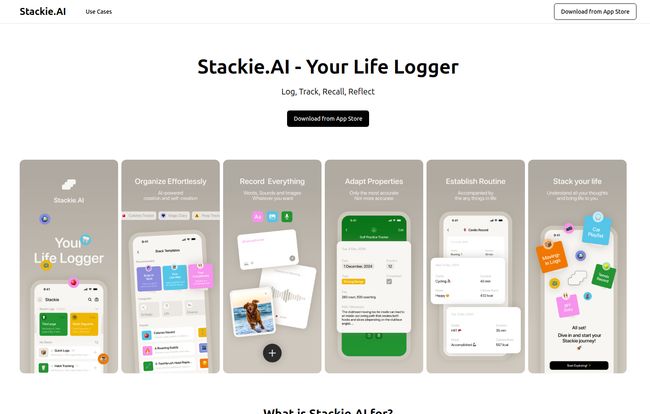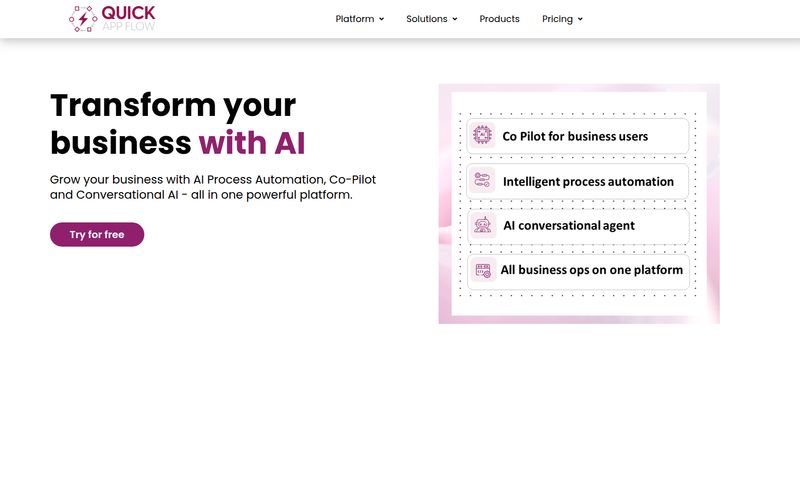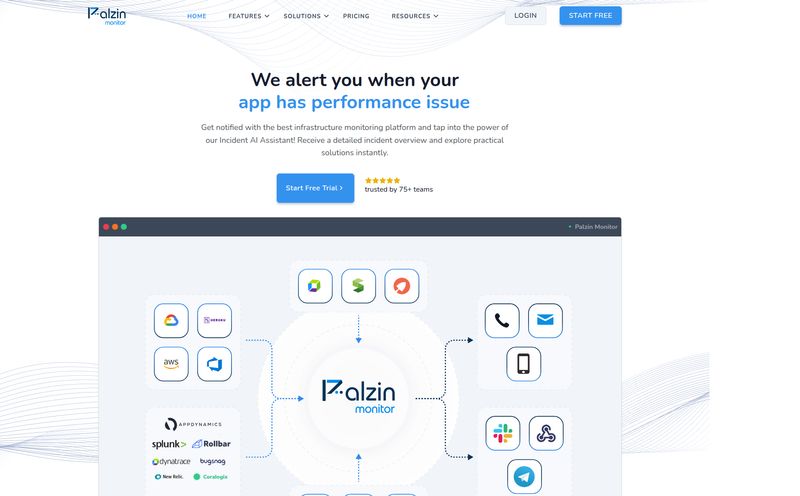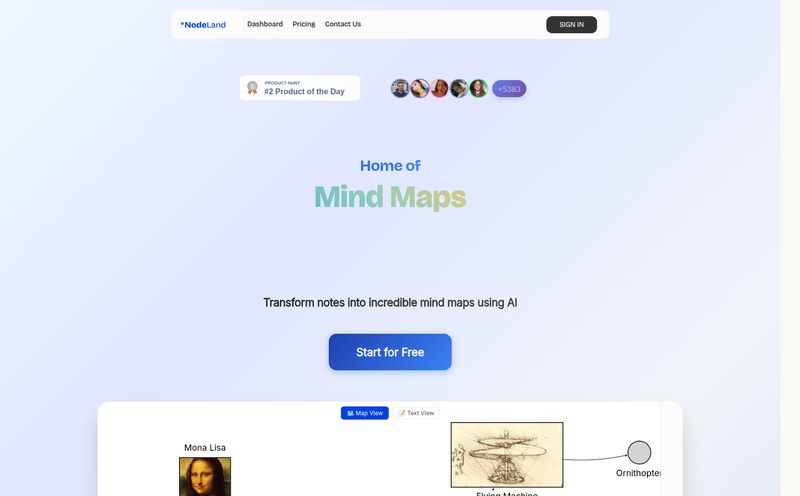If you’re anything like me, your digital life is a sprawling, chaotic mess. I've got half-baked ideas in Apple Notes, brilliant-in-the-moment thoughts in Google Keep, links saved to a browser I never open, and a physical notebook filled with scribbles that might be a grocery list or the outline for a novel. It's a digital junk drawer. For years, I've been on a quest for the perfect system, the one app to rule them all. And every year, a new wave of productivity apps promises to be the one.
Most of them fail. They're either too simple to be useful or so complex they require a PhD to operate. So when I stumbled upon Stackie.AI, I was skeptical. Another life logger? Another AI-powered promise? But something about its approach felt... different. It’s not just about taking notes; it’s about understanding the data of your life. And as someone who lives and breathes data for a living (hello, SEO life), my curiosity was definitely piqued.
So, What Exactly is Stackie.AI?
Calling Stackie.AI just a “note-taking app” is like calling a Swiss Army knife just a knife. It misses the point entirely. The official term is a “life logger,” and the core concept revolves around something they call “stacks.”
Imagine all your thoughts, habits, and ideas are a giant pile of LEGOs. Most apps just give you a bigger box to hold the pile. Stackie.AI, on the other hand, helps you build specific models from those bricks. A “stack” is essentially a custom, structured database for a specific part of your life. You can have a stack for your daily gratitude, one for tracking your workouts, one for comparing coffee beans (don’t judge), and another for logging those weird dreams you have. It takes the chaos and gives it a framework.
The input is dead simple: you can type, snap a photo, or even talk to it. The app then uses its AI brain to auto-organize that info into the right stack. It’s this structure that forms the foundation for everything else.

Visit Stackie.AI
My First Impressions: Actually Stacking My Life
I decided to dive right in. My first challenge? The daily brain dump. I'm a big believer in getting thoughts out of my head to make space. Inspired by one of the user testimonials on their site—a self-described “5-Minute Daily Dump”—I created my first stack. The process was surprisingly intuitive. You can literally just tell the AI what you want to track, and it builds the structure for you. Or, you can pick a template if you're not feeling creative.
One user, Fred Basks, called it “nerdy but powerful,” and I get it now. There’s a satisfying, nerdy pleasure in creating a perfect little system for some part of your life that was previously just floating in the ether. It’s the same feeling as perfectly organizing a bookshelf or sorting your spices alphabetically. A little bit of order in the chaos.
The AI Magic Is More Than a Gimmick
Okay, let's talk about the AI. The term “AI” gets thrown around so much these days it’s almost lost all meaning. But here, it feels purposeful. The real standout feature for me is the ability to chat with your own data. This is where it goes from a neat database to a personal analyst.
For example, after a week of logging my daily energy levels and coffee intake (yes, I made a stack for that), I could simply ask it, “Create a chart showing my energy levels vs. my coffee intake this week.” And poof. A widget appears with a neat little visualization. No exporting to a spreadsheet, no fiddling with chart settings. I just... asked. This is the kind of practical AI application I've been waiting for.
The website even mentions using it as an AI teacher to learn Spanish or creating a “magic diary” to chat with your favorite characters. It’s a bit whimsical, but it speaks to the platform’s flexibility. It’s a playground for your data.
Who Is This App Really For?
I don't think Stackie.AI is for everyone. If you’re happy with a single, simple text file for your notes, this might be overkill. But for a few specific types of people, I think this could be a revelation.
The Dedicated Journaler
If you're already into journaling, gratitude logs, or dream diaries, this is a major upgrade. It provides structure that a blank page lacks. The ability to tag entries, track moods over time, and see patterns emerge can turn a simple diary into a powerful tool for self-reflection.
The Health and Habit Tracker
Sure, there are dedicated apps for tracking workouts or calories. But what if you want to track your sleep, your water intake, and how they affect your mood, all in one place? With Stackie.AI, you can build that custom dashboard yourself. You’re not limited by what some developer thought was important; you track what’s important to you.
The Quantified-Self Enthusiast and the Neurodivergent Mind
This is the sweet spot. If you love data and self-improvement, this is your sandbox. But I was most struck by a testimonial that called it an “ADHD Lifesaver.”
“I didn’t know I needed this one thing, but it’s sooooo helpful... My therapist recommended me to note down my emotional state when I have an impulse. It is very difficult to establish a habit. I don’t do it just because there’s not an app for it anymore.”
This makes so much sense. For minds that can feel chaotic and unstructured, a tool that provides an external, easy-to-use structure can be transformative. It’s a way to offload the mental burden of organization, making it easier to see patterns and build habits.
The Good, The Not-So-Good, and The Privacy Question
No tool is perfect, right? After playing around with it, I've got a pretty clear picture of its strengths and weaknesses.
What I love is that feeling of clarity. Building a stack for a specific project or area of my life imediately reduces my mental load. It’s a clean, well-lit room for those thoughts to live in. The AI-powered widgets are genuinely useful and feel a little like magic.
On the flip side, there is a small learning curve. It’s not as simple as just opening a note and typing. You have to think a little bit about the structure you want to create. For some, this initial setup might feel like a barrier. And, of course, the reliance on AI won't be for everyone.
Then there’s the big one: privacy. You're potentially pouring a lot of personal, sensitive information into this app. I took a look at their privacy policy, and I'd strongly suggest anyone considering the app do the same. This goes for any app, but especially one that holds your personal data. Be an informed user and understand where your data is going and how it's being handled.
What's the Price for an Organized Mind?
So, the big question: what does it cost? As of writing this, the Stackie.AI website doesn't list specific pricing tiers. It prominently features a “Download from App Store” button, which tells me it's currently an iOS-first platform. This usually means one of two things: a free version with in-app purchases to unlock premium features, or a subscription model. My advice is to head to the App Store listing to get the most current and accurate pricing information. It seems like the kind of app you can try for free to see if the system clicks with you.
Conclusion: Is Stackie.AI Worth a Download?
After a week of stacking, logging, and tracking, I’m genuinely impressed. Stackie.AI is not just another note-taker. It's a tool with a strong, opinionated take on how personal information should be managed. It’s for the person who wants to do more than just record their life—they want to understand it.
If you're drowning in a sea of digital notes and looking for a lifeboat, this might be it. If you've been searching for a flexible way to track your habits or if the idea of a structured “second brain” appeals to your nerdy side, then absolutely give it a try. It might just be the organizer your messy brain has been looking for.
Frequently Asked Questions about Stackie.AI
- 1. What is a “stack” in Stackie.AI?
- Think of a stack as a personalized, structured template for a specific area of your life. Instead of one long, messy note, a stack organizes your entries into a clean, sortable database. For example, you could have a “Workout” stack with fields for exercise, duration, and intensity.
- 2. How do I create a new stack?
- You have two main options. You can either choose from a pre-made template or simply tell the AI in plain language what you want to create. For instance, you could say, “Create a stack to log my daily thoughts and mood,” and the AI will build it for you.
- 3. Is Stackie.AI just for journaling?
- Not at all! While it's great for all kinds of journaling (gratitude, dreams, daily dumps), its use cases are much broader. People use it for health and fitness tracking, managing work projects, comparing products, AI-assisted learning, and more. If you can track it, you can build a stack for it.
- 4. Can I use Stackie.AI for work or professional tasks?
- Absolutely. It's a great tool for organizing meeting notes, tracking project progress, or even creating a simple CRM for your contacts. The ability to structure information makes it very useful in a professional context.
- 5. Is Stackie.AI available on Android?
- Currently, the website and branding point exclusively to the Apple App Store, so it appears to be an iOS-only application for now. It's always a good idea to check their official website for any updates on platform availability.
- 6. What about my data privacy?
- As with any app that handles personal information, it's very important to review their privacy policy. Stackie.AI is a tool for logging personal data, so you should understand how your information is stored and used before committing to the platform. You can find their policy on their website.



